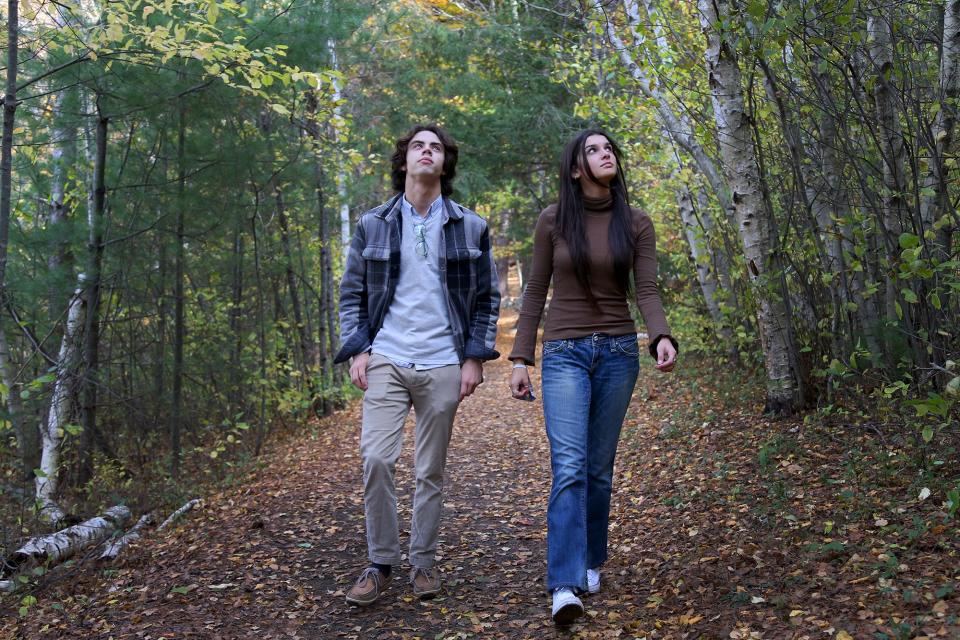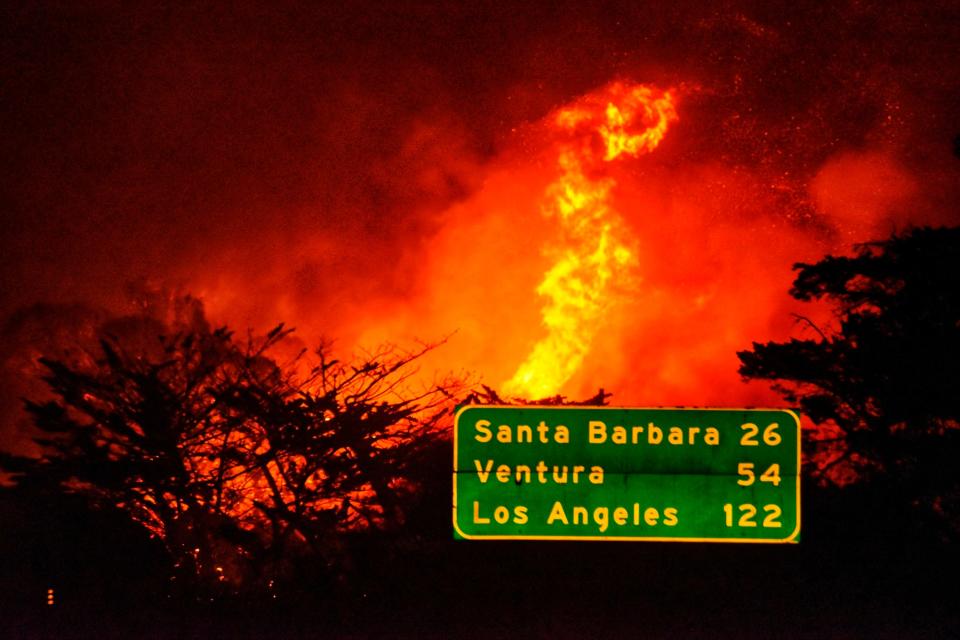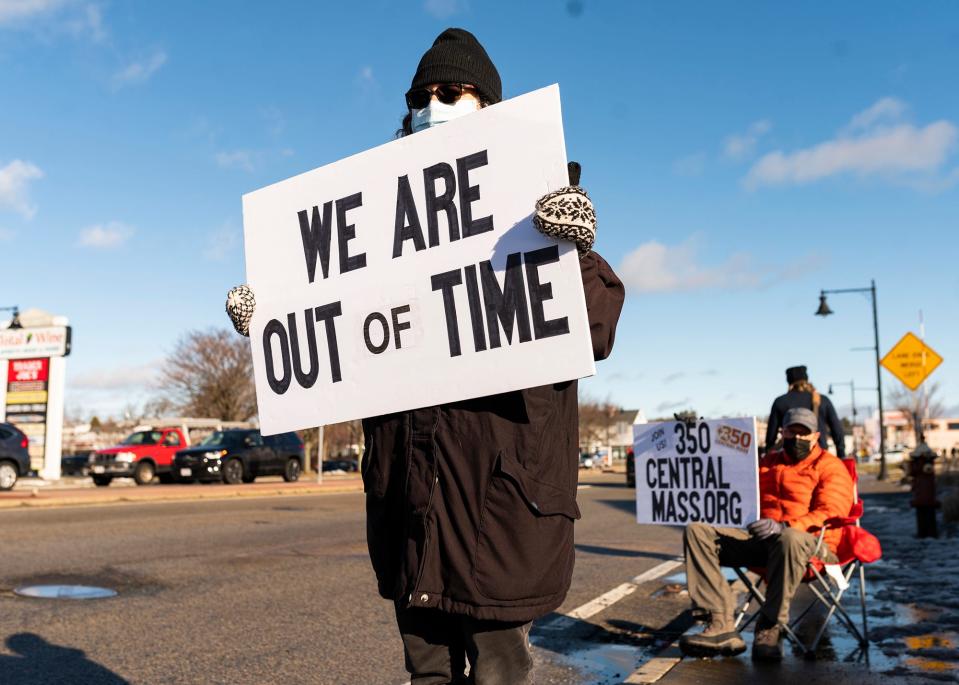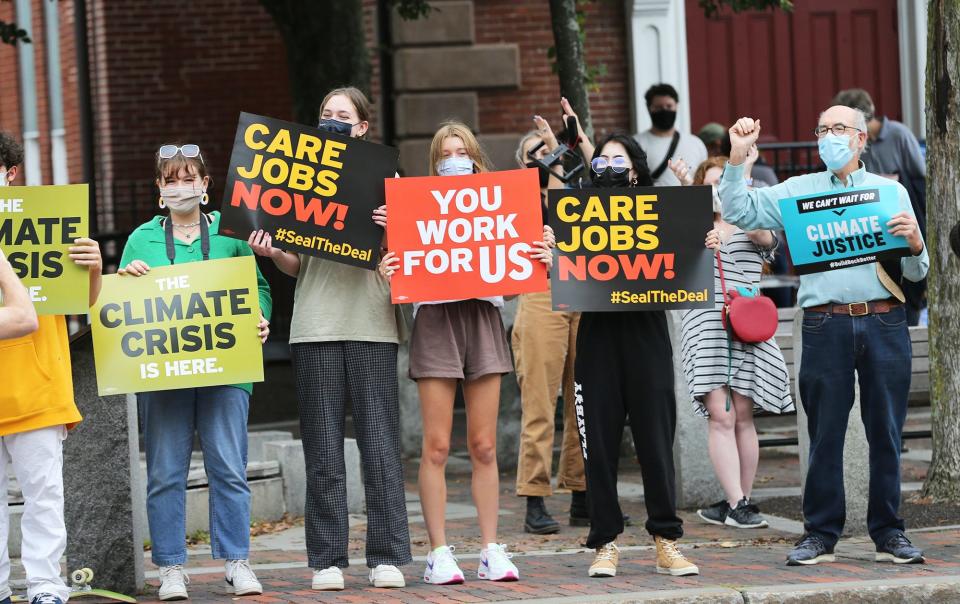Climate anxiety: Amid feelings of hopelessness, some turn to 'climate-aware' therapists for help
PROVIDENCE, R.I. — Sixteen-year-old Ben Doyle often feels "pervasive guilt." It creeps up when he leaves the water running a little too long while brushing his teeth, or when he drinks from a single-use plastic bottle.
In those moments, he says, "I really feel like I’m only hurting myself and acting against my interests and the interests of everybody around me."
Doyle, a student at Portsmouth High School in Portsmouth, New Hampshire, said he experienced "hopelessness" when the U.S. withdrew from the Paris Climate Agreement in 2020.

The term "climate anxiety" immediately strikes a chord with him – the phenomenon of emotional distress stemming from the planet's environmental crisis. Around the world, members of Generation Z – currently 9-24 years old – are experiencing it acutely, according to new data. And many people in their child-bearing years are torn between the future that awaits and their personal desire to have kids.
From not having kids to battling anxiety: Climate change is shaping life choices and affecting mental health
A first-of-its-kind global survey published in September, led by academics from the University of Bath in the U.K. and the Stanford Center for Innovation in Global Health, showed the psychological toll the climate crisis is taking on young people. Among high percentages thinking the future is frightening, or that humanity is doomed, many of the 10,000 respondents – ages 16-25 from 10 countries – also said the perceived inadequate government response is associated with feelings of betrayal.
Forty-five percent of young people surveyed said their feelings about climate change negatively affect their daily life and functioning.

Therapists specialize in 'climate awareness'
Addressing this rise in personal suffering over the climate crisis, a new brand of psychological research and practice has emerged. People looking to ease their anguish can now see "climate-aware" therapists – therapists who "recognize the current climate crisis both as a globe-spanning challenge to the sustainability of human and non-human life on Earth and as a deeply personal challenge with many psychological impacts," according to the Climate Psychology Alliance of North America.
Kelsey Hudson, a climate-aware therapist who works at Boston University's Center for Anxiety and Related Disorders, said climate "distress" – the term she prefers to use because it encapsulates a wider range of emotions – shouldn't be viewed as a diagnosis, but rather a normal and rational response to an existential crisis.
"We don't want to challenge people to reframe or change how they’re thinking, because it’s invalidating to say, 'You’re anxious about the climate crisis? That’s catastrophizing.' It’s really not, it’s adaptive."

Hudson, who lives in Cambridge, also runs a private practice specifically dedicated to young people and adults with climate distress. Her clients – a lot of whom are activists – are experiencing overwhelm, traumatic stress, grief, sadness and anger, she said.
"Many of my clients are angry with the focus on individual action, versus the need for societal action," Hudson said. "And many are distressed how climate change is an inequality multiplier, how the impacts will not be felt equitably amongst people."
Because people of color are inequitably touched by climate change, research has shown they care more about it, too.
A 2020 Yale University study found that Hispanics/Latinos (69%) and African-Americans (57%) are more likely to be alarmed or concerned about global warming than whites (49%). They're also more likely, the study showed, to join a campaign to convince elected officials to take action.
'I wish I had been wrong'
On a spring morning in 2014, Kate Schapira, a poet who teaches at Brown University, set up a table and stool in a downtown Providence, Rhode Island park and put a hand-painted sign out in front. It read: “CLIMATE ANXIETY COUNSELING 5¢. THE DOCTOR IS IN”.
Part public art installation and part serious effort to stimulate conversation around a subject that was consuming her, Schapira’s act, with its tongue-in-cheek nod to Lucy’s psychiatric booth in the Peanuts comic strip, drew international media attention.
What seemed a novelty then, appears prescient now. Schapira’s expression of her worries over the warming planet came before the words “climate anxiety” or “climate grief” entered the popular lexicon.

“I wish I had been wrong,” she said recently. “I wish that was a turning point for the damage that all of us are caught up in.”
Schapira is not a trained therapist. She came up with the idea for “counseling” sessions after talking with friends who all believed that climate change was happening but didn’t feel the same type of angst. She wanted to sit down with strangers to understand if they felt differently.
As it turned out, there were other things of more pressing concern to many of them – housing uncertainty, health problems, domestic abuse. To Schapira, the problems appeared to lead back to the same economic systems and power structures that gave rise to the fossil fuel industry and climate change.
Costs of climate change: What are the effects of climate change costing consumers, on average?
It spurred her to community action, getting involved, for example, in the successful fight against a proposed natural gas-burning power plant in northwest Rhode Island. And she encouraged others to do the same, giving them the names of social justice and environmental groups.
“What I was trying to do was connect people with each other and with their own strength and potential,” she said.
Schapira kept up the sessions summer after summer, setting up in farmers’ markets, art fairs and other community events. Before going on hiatus last year because of the pandemic, she had talked to more than 1,200 people.
Now, she’s putting together a pitch for a book that would be based on those conversations.
Climate change impacting decisions on whether to have children
Schapira feels better for the work, but her fears about the climate have hardly eased. A few years ago, she and her husband decided not to have children, a choice made in response to a combination of environmental and political concerns. In part, Schapira feels that having a baby would shift her focus from activism, she said in an essay for the website Catapult.
The couple is not alone in questioning whether to bring children into an uncertain world. Four of every 10 young people are hesitant about having children, according to the results of the global survey released in September.
Lucia Hillman is a junior at Portsmouth High School in New Hampshire, and with Doyle participates in the school's Eco Club. She started listening to a podcast on climate change that said deciding to forgo having children is the best thing someone can do to ease the crisis.
"I think I would want to have kids one day, but whether I raise a climate activist or not, how will that help the planet?" Hillman said. "And then I think, by then, will it even be safe?"

Seven years ago, when Meghan Kallman, an activist and academic in Pawtucket, Rhode Island, met Josephine Ferorelli, a Chicago-based writer, they had an immediate connection and got around to sharing similarly conflicting thoughts around having children.
The exchange helped expose what they saw as a gap at the time between the talk around climate change and how people believed it would affect their lives. And it spurred them to create Conceivable Future, a global forum for people to air their concerns about reproduction in the age of climate change.
“I had this feeling that these are the type of conversations we want people to be having,” Ferorelli said of that first meeting with Kallman. “These judgment-free conversations that permit people to feel into the experience they’re having, instead of imagining a glacier or a polar bear, but understanding that the crisis is here as well and we won’t get anywhere until we understand the stakes of it.”
The group's website has dozens of testimonies of people grappling with questions about their carbon footprint and more severe climate impacts.
“Every time a family member or friend announces they are expecting a baby, I am overwhelmed with sadness and helplessness,” a person identified as Kate wrote.
But while the site and the house parties organized by Conceivable Future are designed to facilitate discussion, Kallman and Ferorelli – neither of whom have decided whether to have children – hope that their work can also lead to action.
“For us, the only right thing is to fix our system so that we emit less and we create fair jobs, opportunities, lives, access to healthcare. It’s the only moral position that we’re taking,” said Kallman, a sociologist at the University of Massachusetts Boston who was elected to the Rhode Island Senate last year.
'The kids are not alright'
Olivia Chatfield found herself driving towards Alewife station this summer without sight of the Boston skyline – smoke coming from the western wildfires blanketed Massachusetts and much of New England.
Her summer school students noticed it, too, as they readied to go outside for playground time. "These are 5- and 6-year-olds, and they were asking questions about it, asking what’s going on," she said.

Looking back, Chatfield – who lives in Somerville and is a member of Sunrise Movement Boston – wishes she'd educated them with stories on how Indigenous people have historically used fires to take care of ecosystems, paired with modern-day fire safety information. Helping them relate the problem to something tangible, she said, is important. Otherwise, they just have fear.
Being a young person herself and spending her working life with even younger people as a fifth-grade teacher in Revere, Chatfield said the climate crisis paired with an overall feeling of instability is "really heavy." Many of her students are also low-income and of color, meaning they're historically more exposed to climate change impacts.
"The kids are not alright," said Chatfield. "The most tangible way we can get the kids alright is actually changing things, on a big scale. If we want to improve youth mental health, we also have to make a better place for them to be kids."
That large-scale change is what keeps Vickash Mohanka up at night – the fact that politicians have proven so far they're unwilling to take those steps. Over the last few years, he said, he's struggled to find optimism.
"We all feel like we're left out to hang, while nothing is happening to help regular people."
Mohanka, a Westborough resident, previously worked for the Massachusetts state Legislature writing energy legislation, but ultimately chose to leave for climate activism work. He found working in politics frustrating, vexing.
"We spend all this time accurately describing problems, and then we come up with solutions that are nowhere near the scale of the problem," he said.

'The power of talking'
Remaining hopeful and empowered is the theme of several recently published books, including “Saving Us: A Climate Scientist’s Case for Hope and Healing in a Divided World," “All the Feelings Under the Sun" and "How to Talk to Your Kids about Climate Change: Turning Angst Into Action."
A popular online newsletter called Gen Dread focuses on "staying sane in the climate and wider ecological crisis."
People can languish in their climate distress, or they can turn it on its head and use it for good.
Hillman, 16, believes strongly in local displays of collective action. She cited a recent climate strike in her downtown that drew 40 people.
"I think these small but very significant representations of fight for climate action, those really empower others," she said. "The more people that act and show care, it’s signs of hope for change."

Hudson agrees that young people talking to each other is perhaps one of the most powerful mechanisms for combatting climate distress – in lieu of systemic change by governments and industries.
"One thing I come back to over and over again is that there is pretty much nothing as powerful as peer messengers," Hudson said. "The power of talking about your feelings to friends, families, teachers cannot be overstated. And that is something I talk with a lot of my child and teen clients about. No, you can’t vote, but you could talk with several of your friends and have a great deal of influence."
The idea of focusing on solutions is also at the center of a training program on climate change communication that Jennifer West leads in Rhode Island. Hundreds of people with state and federal agencies, environmental organizations, land trusts and political groups have gone through the sessions, says West, a coordinator with the Narragansett Bay Research Reserve.
For scientists and other environmental officials who work every day on issues related to climate change, a feeling of beleaguerment can set in. How does a wetlands expert not get down knowing that salt marshes, which are vital habitats for fish and birds, are being flooded by rising seas?
West’s response: There are places where marshes have been elevated by adding sand on top of them and then planting grasses in the new material.
“That’s what we’re taught to do,” she said. “If we don’t give people some hope and give people the tools to effectively communicate to give others hope, then we’re kind of doomed.”
And similar to what Conceivable Future and others are doing, the aim is more than just having a conversation.
“The communities that are most resilient are the ones with the highest social cohesion. It’s all about getting with other people and talking about this,” West said. “Hope promotes dialogue and dialogue promotes action.”
This article originally appeared on USA TODAY NETWORK: Feeling climate anxiety? Consider a climate-aware therapist for help

